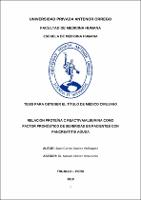Relación proteína C reactiva/albumina como factor pronóstico de severidad en pacientes con pancreatitis aguda

View/Open
Download
(application/pdf: 455.6Kb)
(application/pdf: 455.6Kb)
Date
2019Author(s)
Suarez Velásquez, Juan Carlos
Metadata
Show full item recordAbstract
Objetivo: El propósito del estudio fue determinar que la relación proteína C
reactiva/albumina es un factor pronóstico de severidad en pacientes con
pancreatitis aguda.
Material y Métodos: Se realizó un estudio de casos y controles, con un tamaño
de muestra de 148 pacientes, que cumplieron con los criterios de selección, que
fueron distribuidos en los grupos, 37 pacientes con pancreatitis aguda grave
(casos) y 111 con pancreatitis aguda no grave (controles), se evaluó que el valor
de la relación PCR/albúmina > 16.3 como factor de severidad en el Hospital
Víctor Lazarte Echegaray, periodo 2014 – 2018, la diferencia de ambos grupos
se realizó con la prueba de Chi cuadrado, T- student, Odds ratio.
Resultados: De los 37 pacientes con pancreatitis aguda grave el 54.1% son
mujeres y el 45.9% son varones, con p > 0.05 que nos dice que el sexo no influyó
significativamente con esta entidad. Las edades que más presentaron una
relación PCR/albúmina >16.3 y pancreatitis aguda grave fueron los pacientes
entre 18 - 35 años. Por otra parte dentro de las comorbilidades (obesidad, la
hipertensión arterial, diabetes mellitus tipo II) y las infecciones intrahospitalarias
(p = 0,97) no tuvieron significancia estadística asociada a la pancreatitis aguda
grave. La relación PCR/albúmina >16.3 se presentó en el 80% (30 casos) de los
pacientes con pancreatitis aguda grave y el 61.3% (68 controles) de los
pacientes con pancreatitis aguda no grave, OR: 2.7 (IC=1,094 - 6,713), X = 4.87 y un p<0.05. Conclusiones: En los pacientes con cuadro clínico de pancreatitis aguda con
una relación PCR/albúmina >16.3 tiene 2.7 veces más probabilidad de presentar
su forma grave. La estancia hospitalaria prolongada y las infecciones
intrahospitalarias no están asociadas a la pancreatitis aguda grave. Objective:
The purpose of the study was to determine that the C-reactive protein/albumin
ratio is a predictive factor of severity in patients with acute pancreatitis.
Material and methods:
A case-control study was conducted, with a sample size of 148 patients, who met
the selection criteria, which were distributed in the groups, 37 patients with severe
acute pancreatitis (cases) and 111 with acute non-severe pancreatitis (controls),
It was evaluated that the value of the CRP/albumin ratio> 16.3 as a severity factor
in the Víctor Lazarte Echegaray Hospital, period 2014-2018, the difference of
both groups was made with the Chi square test, T-student, Odds ratio.
Results: The 37 patients with severe acute pancreatitis, 54.1% are women and
45.9% are men, with p> 0.05 telling us that sex did not significantly influence this
entity. The ages with the highest CRP/albumin ratio> 16.3 and severe acute
pancreatitis were patients between 18-35 years. On the other hand, within
comorbidities (obesity, blood hypertension, diabetes mellitus type II) and
nosocomial infections (p = 0.97) had not statistical significance associated with
severe acute pancreatitis. The CRP/albumin ratio> 16.3 occurred in 80% (30
cases) of patients with severe acute pancreatitis and 61.3% (68 controls) of
patients with acute non-severe pancreatitis, OR: 2.7 (CI = 1.094 - 6.713), X = 4.87 and a p <0.05.
Conclusions: In patients with clinical symptoms of acute pancreatitis with a
CRP/albumin ratio> 16.3, it is 2.7 times more likely to present its severe form.
Prolonged hospital stay and nosocomial infections aren’t associated with severe
acute pancreatitis.
Collections
- Medicina Humana [3219]

